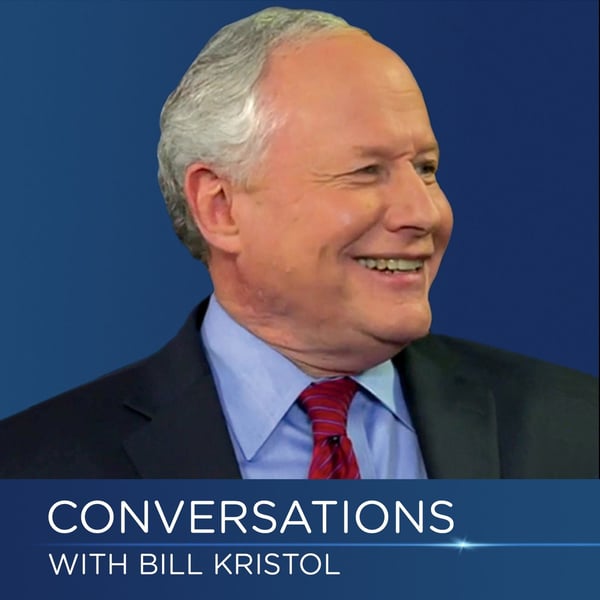Harvey Mansfield on Locke, Aristotle, and the Spirit of Liberalism
Conversations with Bill Kristol
Conversations with Bill Kristol
4.7 • 1.7K Ratings
🗓️ 20 December 2022
⏱️ 81 minutes
🧾️ Download transcript
Summary
Transcript
Click on a timestamp to play from that location
| 0:00.0 | Hi, I'm Bill Crystal. Welcome back to Conversations. I'm very pleased to be joined again today by Professor Harvey Mansfield, Harvard. We've had 21 excellent conversations with him, and this will be the 22nd. |
| 0:28.0 | But one topic we've somewhat skipped over, I'd say, in these conversations is a topic that Professor Mansfield has written on and spoken on an awful lot, and very importantly and intelligently, of course, which is liberalism and particularly the origins of liberalism in Hobbes and Locke. So the most recent conversation was on Machiavelli and Montesquieu, but there are these thinkers who are in between those two. |
| 0:54.0 | Professor Mansfield has been, I think, our friend Peter Berkerwitz quoted you, Harvey, as having once summarized your recommendation for the presentess, Locke in the short term and Aristotle. In the long term, I also vaguely remember a version of it is that you thought Aristotle was had more of the truth, and Locke was more relevant or something to our current situation. |
| 1:18.0 | We've talked about Aristotle for our manual, which we will sum today too, but anyway, welcome. Thank you for joining me again and explaining and I suppose defending somewhat liberalism. I think you had a book called The Spirit of Liberalism, which I highly recommend to everyone, which I amazingly came up 45 years ago, which you say you are a friend of liberalism who intends to defend liberalism. So do it again 45 years later. |
| 1:45.0 | All right, very good. Thank you because liberalism does seem to be under under special attack or renewed attack from illiberalism today, especially on the right. |
| 1:58.0 | But let me say about Aristotle and Locke. Yeah, I think that it's better to say that Aristotle has more truth and Locke has more relevance, but on the other hand, perhaps I can show that both of them continue to be relevant. |
| 2:13.0 | And in their separate ways, perhaps Aristotle much more have a significant relationship to the truth. |
| 2:25.0 | But let's look at starting from the illiberalism of today, and especially on the right in America, the common good conservatism, which we're hearing about. |
| 2:41.0 | People, most of them Catholics, they want to return to Thomas Aquinas, but Thomas Aquinas, when you look at him speaks of the philosopher, and it isn't himself, it's Aristotle. |
| 3:01.0 | Let's go directly to Aristotle and see whether this Aristotle is going to force us to give up on liberalism. |
| 3:17.0 | Now, there are two kinds of liberalism that I need to make clear right at the beginning, and that is one is specific and the other is generic, the specific is the liberals that we know today versus conservatism versus conservatives. |
| 3:39.0 | And they leave inclusiveness in compassion, and they like big government when it serves those goals, as opposed to conservatism, which is, |
| 3:59.0 | let's say, some people are better than others, so not not not so much in favor of inclusiveness or at least inclusiveness is not the big problem. |
| 4:15.0 | The big problem is that the better people need to be somehow recognized and rewarded for the contribution that they have, the unequal contribution that they make to others. |
| 4:33.0 | And since we live in a democratic age, conservatives, conservatism, to the degree that they recommend virtue, or people who are better than others, are in embarrassment. |
| 4:51.0 | And they get out of it by looking for virtues that are within ordinary reach, and perhaps the main one they think of is earning, it's better to earn your living than to live on somebody else, especially on the government. |
| 5:11.0 | So that would be a quick statement of the difference between specific liberals and conservatives, but there's also a general or generic liberalism. |
| 5:33.0 | And that's a liberalism, the liberalism of rights, which I think is quite generally believed today, at least in the free world, to the extent that remains. |
| 5:49.0 | This liberalism of rights of rights begins in the 17th century and is best represented by Locke and his forebearer hops. |
| 6:01.0 | And this is illustrated in the fact that the issue of abortion today is a battle between the right to life and the right to choose, both those are rights. |
| 6:20.0 | So that's our language of politics today, and that's the generic liberalism that I'm distinguishing from the specific which includes conservatives. |
| 6:37.0 | Now, the common good conservatives think that they are always losing to the left, and they want to change the game if you could put it that way. |
... |
Please login to see the full transcript.
Disclaimer: The podcast and artwork embedded on this page are from Conversations with Bill Kristol, and are the property of its owner and not affiliated with or endorsed by Tapesearch.
Generated transcripts are the property of Conversations with Bill Kristol and are distributed freely under the Fair Use doctrine. Transcripts generated by Tapesearch are not guaranteed to be accurate.
Copyright © Tapesearch 2025.

